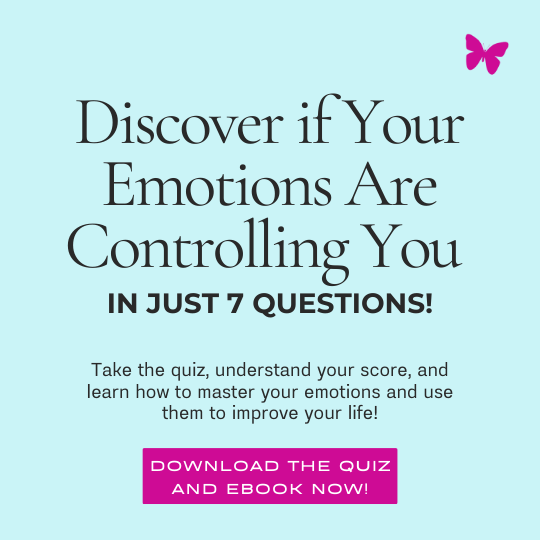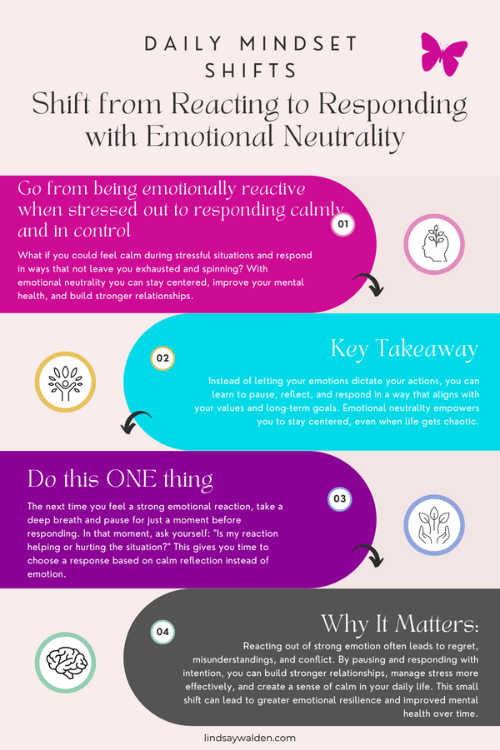How to Stay Calm, Focused, and Thrive in Everyday Life
In our fast-paced, stressful world, it can feel like emotions are running the show. Whether it's stress from work, family pressures, or unexpected life events, it's easy to get caught up in waves of emotions. But what if you could handle all of life’s ups and downs with calm, focus, and resilience? That’s where emotional neutrality comes in. It's a powerful way to manage your emotions without letting them control you, and it can lead to real, positive changes in your life.
Let’s break down what emotional neutrality is, how it works, and why it’s a game-changer for your mental and physical health, relationships, and overall well-being.
What is Emotional Neutrality?
At its core, emotional neutrality means finding balance and staying calm in emotional situations. It’s not about ignoring or suppressing your emotions but learning to acknowledge them without letting them take over. Emotional neutrality helps you stay clear-headed and make better decisions, even when life gets tough.
Emotional Neutrality gives you greater emotional resilience
When you practice emotional neutrality, you build emotional resilience, which is your ability to bounce back from stress, challenges, or adversity. Instead of getting stuck in negative emotions, you can process them, learn from them, and move forward.
For example, if you lose your job or go through a breakup, emotional resilience means you’re able to feel your emotions, but you don’t let them knock you down for good. You don’t ignore the hard stuff, but you also don’t let it define your life. This makes it easier to recover from setbacks and maintain a sense of stability even when life is tough.
Looking to build emotional resilience and improve your mental health? These simple tips can help you bounce back from stress, manage anxiety, and stay emotionally balanced. Learn how to boost your emotional strength and thrive in everyday life.
Emotional Neutrality improves relationships
Staying neutral in emotional situations can have a huge impact on your relationships. Emotional neutrality allows you to approach conflicts calmly, without letting anger or frustration take over. This leads to better communication and stronger connections.
For example, in a disagreement with a partner, emotional neutrality helps you keep your cool, listen to their perspective, and work toward a solution rather than getting stuck in a fight. This creates a more open and honest space for communication, helping to resolve conflicts and build a healthier relationship.
Emotional Neutrality increases self-awareness
When you practice emotional neutrality, you become more aware of your thoughts and feelings. This self-awareness allows you to better understand your emotions and recognize patterns that might be holding you back.
For instance, maybe you notice you tend to get defensive when certain topics come up in conversations. By being aware of this trigger, you can work on responding differently in the future, which can lead to personal growth and stronger relationships.
Emotional Neutrality enhances focus and productivity
Emotional neutrality isn’t just about staying calm—it can also help you stay focused and productive, especially in high-pressure situations. When you’re not caught up in emotions, you can direct your energy toward getting things done and reaching your goals.
For example, if you’re in a stressful work environment, emotional neutrality helps you stay centered. Instead of getting overwhelmed by the pressure, you can focus on your tasks and do your best work, which can lead to greater success in both your career and personal life.
Emotional Neutrality gives you better mental and physical health
Chronic stress and emotional overwhelm can take a serious toll on your health, contributing to anxiety, depression, high blood pressure, and even a weakened immune system. Practicing emotional neutrality can help reduce these negative effects by giving you better control over your stress levels.
When you manage your emotions effectively, you’re less likely to experience burnout or ongoing mental health struggles. You’re also better equipped to maintain your physical health, as stress and strong emotions are linked to many health issues. Emotional neutrality promotes a sense of calm and balance, which can improve your overall well-being.
Looking for ways to stay emotionally balanced? Discover simple mindfulness practices that help you stay grounded, manage stress, and improve your overall emotional health. Perfect for anyone seeking peace of mind and inner calm.
How to Develop Emotional Neutrality
Developing emotional neutrality takes time and practice, but with consistent effort, you can start seeing the benefits in your everyday life. Here are some simple strategies to get started:
5 Simple Strategies to Develop Emotional Neutrality
1.) Mindfulness Meditation: This practice helps you stay present and observe your emotions without judgment. By spending a few minutes each day in mindfulness, you can train your mind to stay calm in emotional situations.
2.) Cognitive Reframing: This technique involves changing the way you think about a situation. Instead of focusing on the negative, try to look at the situation from a different, more neutral perspective. This helps reduce emotional reactivity.
3.) Deep Breathing Exercises: Taking slow, deep breaths can instantly calm your nervous system and help you stay grounded during stressful moments. Practice deep breathing regularly, so it becomes a go-to tool when emotions run high.
4.) Emotional Awareness and Labeling: Simply acknowledging and naming your emotions can help reduce their intensity. For example, saying to yourself, "I’m feeling frustrated right now" can make it easier to handle that emotion without letting it control you.
5.) Visualization Techniques: Imagine yourself in a calm, neutral state during stressful situations. Visualizing how you want to respond can help you stay composed when those situations arise in real life.
Emotional neutrality is a powerful tool that can help you stay calm, focused, and in control, no matter what life throws your way. By practicing emotional neutrality, you can improve your relationships, enhance your focus and productivity, and protect your mental and physical health.
It’s important to remember that developing emotional neutrality is a journey, not a quick fix. It takes patience, practice, and time, but the benefits are more than worth the effort. By committing to these practices, you can build the emotional resilience needed to thrive and achieve your long-term goals.
If you’re ready to start mastering emotional neutrality and take control of your mental and emotional well-being, I can help. Book a session with me, and together, we’ll work on uncovering what’s holding you back and creating a path to a calmer, more fulfilling life.
Learn how to shift from emotionally reacting to calmly responding in stressful situations with this simple mindset shift. Discover how emotional neutrality can help you stay centered, improve your mental health, and build stronger relationships.








